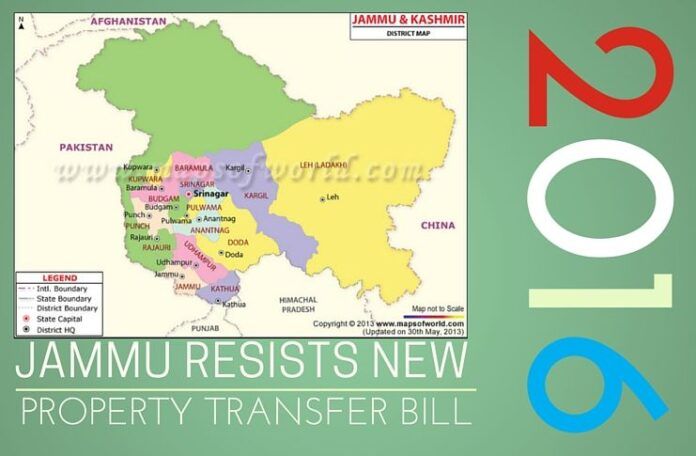
[dropcap color=”#008040″ boxed=”yes” boxed_radius=”8px” class=”” id=””]A[/dropcap] swift and massive resistance launched by Jammu For India (JFI) has compelled the coalition People’s Democratic Party – Bharatiya Janata Party government to scuttle the Jammu and Kashmir Alienation of Land and Transfer of Property Act by referring the same to a select committee of the Assembly.
The Bill was quietly approved by the coalition cabinet on June 23, ironically, the death anniversary of Jan Sangh founder-president Syama Prasad Mookerjee, who died protesting the separate status of Jammu and Kashmir under Sheikh Mohammad Abdullah. The Bill was to be passed by the Assembly on June 30, but was somehow leaked two days earlier.
The credit goes to Pawan Gupta, MLA (Independent, Udhampur), who studied the leaked document and realised the Kashmir-centric design of the PDP and raised the alarm over the Bill. Thereafter, Jammu For India activists jumped into the picture and galvanised the province through a well-established network. They lobbied with BJP MLAs on grounds that the Bill was anti-Jammu and anti-Women. The BJP MLAs in turn alerted the party high command in Delhi about the unexpected development; they were told that on no account was the Bill to be passed in the Assembly.
When the Transfer of Property Bill was taken up in the Assembly, the government was embarrassed to find BJP MLAs Devinder Kumar Manyal and RS Pathania submitting amendments and urging that that the Bill be referred to a select committee nominated by the Speaker. The opposition National Conference, Congress and Communist Party of India (Marxist) supported the Bill and demanded that it be passed, taunting the government for inexperience in approving a legislation it did not understand.
Udhampur MLA Pawan Gupta and Kathua MLA Rajiv Jasrotia (BJP) also moved an amendment seeking withdrawal of the Bill. Caught on the back foot, the Bill was sent to a select committee, considered the ‘graveyard’ of legislation.
[dropcap color=”#008040″ boxed=”yes” boxed_radius=”8px” class=”” id=””]T[/dropcap]he Bill proposed to freeze sale of land by power-of-attorney and agreement-to-sell in Jammu division and thus prevent non-permanent residents from purchasing land. This would effectively make J&K an independent political entity while other Indians would be reduced to the status of ‘aliens’.
Within Jammu, it would debar non-State Subjects from buying land and setting up industries in the province (a situation that currently applies only to the Kashmir valley) and create a situation in which there could be no outside investment, and hence no employment opportunities, for Jammu youth.
Above all, it would adversely impact the children of daughters of Jammu and Kashmir who were married outside the State to non-State Subjects by denying them right to inheritance of ancestral property. Hitherto, women could enjoy property rights during their own lifetime, and could further bequest (will) their property rights in favour of their children. The proposed amendment would make such facility unavailable to women hereinafter, if passed.
Lawyers and human rights activists point out that the proposed amendments would cause J&K women to lose property rights after marrying a non-State Subject person. This would contravene the State High Court judgment on the issue of State Subject rights of women, which was upheld by the Supreme Court. It may be pointed out that this attempt has been made by Valley-based politicians in the past as well, but has always been beaten back.
[dropcap color=”#008040″ boxed=”yes” boxed_radius=”8px” class=”” id=””]J[/dropcap]ammu For India pointed out that the Bill, if passed, would give a free hand to fanatics to change the demography of Jammu and create a Kashmir-like situation there. BJP spokesperson Verinder Gupta admitted as much, saying it was unfortunate that BJP ministers became party to the amendments proposed by PDP in the Cabinet meeting. Members of the Bar said that it was absurd that the BJP, which got a handsome mandate from Jammu region, could let the province down so badly by letting the Bill be mooted.
It seems obvious that the BJP members of the cabinet did not comprehend the nature of changes proposed by the dominant coalition partner, the PDP. That is why they agreed to legislation that abridged the right to equality of women and an entire province. They failed to realise the implications of the proposed amendment of section 138 of the Transfer of Property Act, extending the clause from ‘Kashmir Province’ to whole of ‘State’.
As the Ministers did not take the text of legislation outside the cabinet and discuss it with BJP MLAs and party colleagues prior to giving their consent, their current humiliation is well deserved. Amendment to section 138 of Transfer of Property Act contradicts the Supreme Court decision in Swaran Kumar Jain versus Dev Dutt Mahajan (1993).
The Bill’s statement of objects and reasons states that restriction created under sub-section (3) of section 138 of the Transfer of Property Act, regarding taking possession of and transfer of immovable property for commencing any construction activity is limited to “Kashmir Province” only. Through unrecognized modes like power of attorney, agreement to sell etc., the situation in Jammu division has reached an alarming level, which warrants rectification of the aberration in the principal legislation i.e. sub-section (3) of section 138 of the Transfer of Property Act.
Similarly, section 2 of Alienation of Land Act and section 5 of Transfer of Property Act states that the words lease, sale, gift, bequest are not properly defined with the result the said modes are not considered as permanent/temporary alienation of immovable property. This has resulted in varying interpretations by the Hon’ble Courts facilitating unlawful transfer of immobile property. It is, therefore, expedient to remove the ambiguity so as to safeguard the interests of permanent residents of the State, so far as alienation of immobile property in the state is concerned.
Under this legal jargon, the proposed amendments to the Bill denied women and their progeny their rights to ancestral property if the woman married a non-State subject and lived outside the State. It also surreptitiously extended restrictions applicable only to the Kashmir Valley to Jammu province, making it inhospitable for industry, outside investment, and local employment. In time, this would inevitably alter the demography of the region to the detriment of the local inhabitants.
Most importantly, the new laws would make land allotment impossible for the Army and Paramilitary forces and thus put security operations in jeopardy. The removal of Army bunkers and posts in Srinagar despite the fact that terrorist encounters and infiltrations from across the border are a daily occurrence, has gone down badly in Jammu.
- Plagiarism with Pride - November 10, 2018
- “Hindu-ness is the essence of India” – RSS Sarsanghachalak - September 20, 2018
- Lacunas persist in Kathua story - May 5, 2018











If the BJP Ministers in the Government of J&K are this ignorant it is a regrettable and embarassing incident for both the Government of India and the BJP.
This Bill has been attempted by the GoJK has been in the works a long time and attempts have been made in the past to legislate it. The project of removing the special status of the State of J&K in the Union of India begins with normalising that State’s property’s laws with that of the Union’s; this Bill goes in the opposite direction and therefore the J&K Assembly must cremate it.
I dont understand the logic of this article.. do the author want Jammu province be colonised by the big corporates who controls the indian establishment? I fully support this act, with an amendment that the same applies to kashmir too.. that jammu be created separate entity and even kashmiris cannot buy land in jammu..
We need full federalism where every region of india has the right to protect its land and resources from the corporate plunder in the name of integration and nationalism..
Bharatiya seems to b a fake name for some ISI agent. Otherwise wd not have commented in such a manner. The article has exposed the duplicity of NationLeast BJP in conniving with proPak PDP for enacting such a pernicious law violating even the human rights of daughters of JK married to non state subjects.